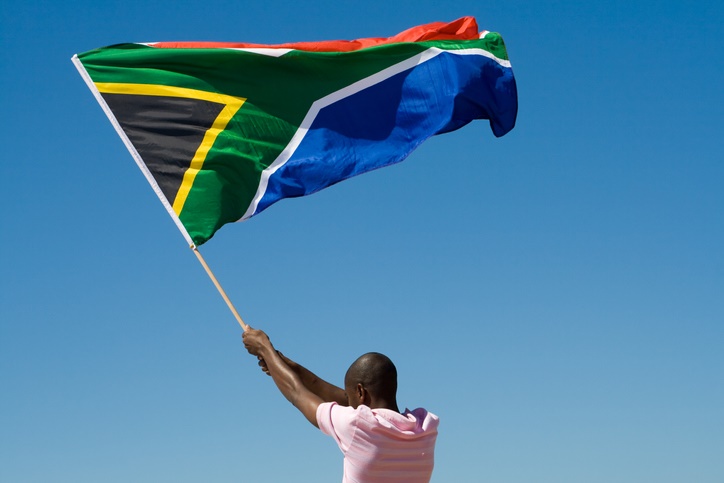
Man waving a South Africa flag (iStock)
Multimedia · User Galleries · News in Pictures Send us your pictures · Send us your stories

Man waving a South Africa flag (iStock)
Multimedia · User Galleries · News in Pictures Send us your pictures · Send us your stories

Our collective tolerance of gross inequities of poverty and unemployment, and inequalities that undermine the humanity of many in our society are all markers of our failures as individuals and nation to embrace Ubuntu, writes Mamphela Ramphele.
There is overwhelming evidence that the cost of our failure to embrace the values of Ubuntu elaborated as human rights in our Constitution, is very high. That cost is reflected in the high levels of violence, crime, corruption and unaccountability in both the public and private sectors that are threatening the stability of our democracy.
All ancient cultures recognised the importance of systematically embedding the core values of society to secure their continuity across time and space from generation to generation. Ancient wisdom also developed rituals for dealing with gaps that may have occurred by omission or commission in the personal development of individuals that often manifest in inappropriate behaviour and practices by those affected.
African wisdom has developed rituals to deal with individuals who may have skipped important milestones in their journey to adulthood such as "imbeleko" (introducing a child to ancestors), "uk'oluka" (initiation into manhood) or to observe the rigour of keeping ancestors informed about important family and kinship affairs "ukwazisa abangasekhoyo," to secure their continuing blessings.
It is time for us as a society to acknowledge that we skipped an important step in our transition to democracy – investing in embedding the values of Ubuntu in all citizens. The values of Ubuntu are essential to enable us to successfully transition from the ugly culture of racism, sexism and economic exploitation of the many by a few, to social justice and democracy. Ubuntu is the foundation on which to build a society governed by respect for human dignity and equality of all.
Our failure over the last 25 years to embrace values-based education to prepare young people to become informed critical thinking citizens cannot be accepted any longer as an act of omission. Too many calls and attempts have been made over the last two decades to embed Ubuntu values and constitutional literacy in our school curriculum's Life Orientation programs without much success.
The question we now need to ask is: who stands to benefit from graduating young people who are unable to critically evaluate what is right and wrong in terms of Ubuntu values translated in our constitution as human rights and responsibilities? The same neglect continues into higher education levels in many institutions from which thousands of young people graduate without the benefit of Ubuntu values and civic literacy.
There is also a huge untapped potential of ensuring that the millions of unemployed young people targetted by President Ramaphosa’s Youth Employment Service (YES) to emerge out of the program with values based civic education in addition to skills development. This is particularly pertinent given the significance of young people in shaping the quality of our democracy.
Our public sector is reeling under the burden of corruption and abuse of power by elites at the expense of the majority. Prof Stan Sangweni, a former chair of the Public Service Commission, made efforts to embed values-based public service in the early 2000s by promoting a Public Service Integrity Management System. Had his values-based approach been embraced and embedded in our public service ethos, we would not have had the unaccountability culture that culminated in state capture.
The question is why has the ANC as the governing party over the last 25 years has not prioritised this values based approach to transform the public service from the apartheid culture to a human rights constitutional democratic one? Who stands to benefit from the continuing culture of unaccountability by the majority of public servants, especially those serving poor people at provincial and local levels?
The same must be said of the failure of the private sector to embed Ubuntu values in personal human capital development strategies and practices of their enterprises. How can it make business sense to expect businesses to thrive in a constitutional democratic order without investing in ensuring that all staff members at all levels of the company are conscious of their rights and responsibilities as citizens and workers? How is it possible that enterprises that profited from racist, sexist and exploitative practices could transform themselves without active investment in changing their institutional cultures?
Who stands to benefit?
Trust is a critical success factor in any enterprise, including business. A shared value system is a foundation for trust in human and social relationships. Why has the private sector not responded to the multiple studies and surveys documenting the low levels of trust in our society? Why would experienced strategic leaders in our business community be blind to this key success factor? Or should we also begin to accept that this is an error of commission and not of omission? Who stands to benefit from continuing mis- and distrust in our society?
The trade union movement has done a fantastic job in organising and mobilising workers across the country. It would be enormously important for unions to transition from transactional relationships with their members towards becoming vehicles for empowerment through higher consciousness of the values of Ubuntu to promote respect for human dignity and equality for all. Empowered workers who can hold their heads high would be better able to challenge impunity in the workplace and abuse that undermine their wellbeing. Society would benefit from empowered workers who would be more productive and able to protect their pension funds and benefits to their dependents.
Chief Justice Mogoeng Mogoeng's exasperation with the ease with which citizens seem to uncritically follow leaders is unlikely to rouse us from our collective gullibility to leaders who betray their promises to voters not once, but many times. Challenging purveyors of fake news who promote divisions and populist responses to complex issues can only come from critical thinking citizens. The lack of shared values by which we judge right and wrong and make the choices by which live as a society, makes building trust in institutions and social relationships difficult.
Our collective tolerance of gross inequities of poverty, unemployment and inequalities that undermine the humanity of many in our society are all markers of our failures as individuals and nation to embrace Ubuntu. If we were to live the values of Ubuntu, our consciousness of our interconnectedness to, and interdependence with our fellow human beings, would not permit us to tolerate the violation of their dignity and denial of their basic rights.
Scandinavian countries have successfully transformed themselves from feudal societies in the 19th century to the current prosperous social democratic countries by using the equivalent of Ubuntu, Bildung, to promote a shared value system. Bildung is a life long process of consciousness raising to promote the maturation process of individuals to assume ever bigger responsibilities toward family, friends, fellow citizens, society, humanity, shared global heritage and to other species, whilst enjoying personal freedoms. They recognise and promote the value system that to be human is to be custodians of self, others and nature.
We have a homegrown remedy for the predicament we find ourselves in as a society still in transition from our ugly past that is haunting the present and imprisoning the future. The remedy lies in taking a long-term view in investing in the embrace of the values of Ubuntu at all levels of society – the home, community, schools, faith-based places of worship, unions and workplaces. What stops us?
- Mamphela Ramphele is co-founder of ReimagineSA.
Disclaimer: News24 encourages freedom of speech and the expression of diverse views. The views of columnists published on News24 are therefore their own and do not necessarily represent the views of News24.